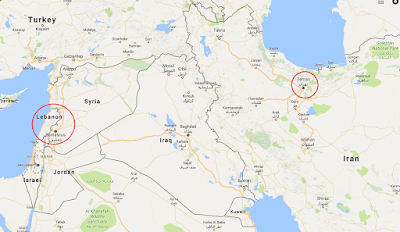 |
| Don't be afraid. Bitcoin is your friend. |
I'm not going to do yet another cryptocurrency explainer here - any of you can go read the Wikipedia article and there's no dearth of authoritative information sources if you want to go deeper. Instead I want to take issue with the Bastard's premise, and challenge some of his conclusions.
The Big Picture
The first question is about the concept of a digital currency itself. It's unclear from his piece what the Bastard thinks about the idea writ large, and yet I struggle with this ambiguity. Setting aside any problems with implementation, is there any reason why an anonymous digital currency - essentially a cash equivalent for use across the internet - should not be welcomed, even embraced? Right now, if you want to transfer funds digitally for any reason, you have to use a bank or financial company as an intermediary. All the details of the transaction are available to business, corporations, marketing companies and governments. We still have cash - even if we use it less than we used to for convenience sake - why shouldn't that option at least be available on the wire?
Pick an Argument
Part of the Bastards distaste for Bitcoin (and presumably all other cryptocurrencies) is that he sees it as an embodiment of the whole Ayn Rand/Ron Paul/Libertarian project, which he hates. I'm sympathetic to this conclusion, even though it is largely incorrect. Why? Well, to whatever extent he finds Libertarians stupid, unrealistic, racist and cruel, I either agree with him or even exceed him in contempt for this 'ideology'. But does this argument truly apply to cryptocurrencies? Well, it's true that they do tend to like the fact that it is not issued by any government or agency, and that it DOES provide a mechanism for avoiding government fees and taxes. But is a solution like Bitcoin really the Libertarian ideal? No, it's not. In general, a currency must meet two often incompatible requirements. It must be a:
1.) Reliable store of value
2.) Functional medium of exchange
Bitcoin is not a reliable store of value. The value of a Bitcoin floats on the exchanges, in a daily dance that all currencies and commodities go through called 'price discovery'. Commodities are worth exactly what people will pay for them, so they are traded on exchanges precisely so that the market can decide how much that is. In short, Libertarians like gold, because its value is intrinsic, rather than based on government backing.
But make no mistake - Bitcoin and other cryptocurrencies are highly functional as a medium of exchange, and are used as such thousands or millions of times every day - to the complete satisfaction of the parties to the transaction.
But People Steal Bitcoins All The Time
Mr. Bastard raises the point that hackers have stolen a lot of Bitcoins. This is true. The primary exchange, Mt. Gox, actually collapsed when hackers were able to take possession of all their Bitcoins. None of their customers could clear any transactions. This is all very true - but is it in any way reflective of the value or worthiness of a cryptocurrency? Actually, no. Hackers are constantly trying to steal anything of value on the internet. They have stolen orders of magnitude more regular dollars and Euros than they have stolen Bitcoins, and they steal intellectual property and pretty much anything they can get their hands on. If you're stupid, lazy, sloppy or just plain unlucky, you could lose anything you have on your computer or in the cloud. Interestingly, it's actually EASIER for a regular user to secure their Bitcoins than it is to secure their bank account. You are completely reliant on your bank to secure your money, but you don't have to store your Private Key online. You can put it on a thumb drive or even print it out, and put it in a home safe or safe deposit box. Hell, if you wanted to, you could print out your key and turn it into a book cypher.
The Greed Factor
The reason that Mr. Bastard chose now to write his Bitcoin piece is very likely because Bitcoin has been in the news quite a bit due to an extraordinary runup in the value of Bitcoins expressed in US Dollars. He clearly finds this troubling, but I can't even begin to imagine what he thinks it tells us about cryptocurrencies. Investors are always looking for a way to diversify their portfolio, so as a high-risk investment, putting some dollars into Bitcoins in a rising market makes perfect sense. The market is volatile, and some people are going to lose money. But that happens all the time, with copper, and oil, and soybeans. Exchanges exist for just this reason - to determine the current market price for a given commodity - and it is no reflection on the underlying commodity. When the price stabilizes, the commodity is still there.
The Blockchain - The Answer to All Your Cryptocurrency Questions
Another highly surprising argument that Mr. Bastard raised is that Bitcoins aren't 'real'. That's false, although the reason it's false is fairly hard to understand. Bitcoin is not a technology - it is a currency, or perhaps a product. The technology that enables cryptocurrencies is a cryptographic-based transaction monitor called the Blockchain. Every Bitcoin that has ever existed, and every transaction that has ever been executed is recorded in the Blockchain. The Blockchain can't be altered, it can't be tampered with, it can't be erased. It is the Blockchain that makes Bitcoins real - they can't ever disappear. Mr. Bastard wrote (referencing the Tulip panic of the seventeenth century) that at least, unlike Bitcoins, tulip bulbs were 'real' and still had value as tulip bulbs. Again, he's talking about the inherent value of a currency. Take your wallet out of your pocket. Look inside. You'll see pieces of green paper, cut to a uniform size and printed with a picture of a dead president. What is the inherent value of a $20 bill? I'm pretty sure it's zero. That is the magic of fiat currency - the money is representative of value. It doesn't carry that value in and of itself. Once again, this is why Libertarians prefer gold.
Let There Be Bitcoins
Speaking of fiat currency - and man, do Libertarians HATE fiat currency - the government produces those pieces of green paper using a printing press. So how the hell do you produce Bitcoins? Unsurprisingly, the Blockchain provides an answer to that question. It's called 'mining', and by providing the distributed computing power required for the large scale calculations made within the Blockchain, a user is periodically rewarded with one Bitcoin. It's exactly like a printing press turning paper and ink into money, but it's digital, so it uses processing power and connectivity instead. Once again, Mr. Bastard seemed to have a problem with this process, but he never really made it clear what that problem was.
Lions and Tigers and Mobsters, Oh My
And, of course, there's the standard complaint. If you have an anonymous digital cash-equivalent, then people will use it for criminal purposes. Of COURSE they will. Let me tell you a quick story. Back in the early '80s, I let a friend of mine use my apartment in San Rafael as the operational headquarters for a very large cocaine transaction being shipped to Alaska. I was not a known drug dealer, and I had the defensive wherewithal to protect both the cocaine and the money. So on the appointed night, I had five guys crawling around on my living room floor, carefully arranging foot-high stacks of US Currency from the wall to the kitchen. It was a SEA of money - more than I have ever seen in one place before or since. It was striking, really. But it occurs to me that nobody ever suggested that we get rid of cash dollars because they get used for purposes like that. That's not ALL they're for, and we like the freedom of using cash anytime we want that reassurance that our purchase is untracked.
Conclusion
The idea of a cryptocurrency was easier than the execution. This is a whole new concept, and it was based on some programming and a bunch of math and it was hard. There have been some birthing problems, but they're getting addressed. When we finally have a solid, stable, broadly accepted cryptocurrency, it probably won't be Bitcoins at all. But Bitcoins is where we learned how to do this, how to roll out a Blockchain based payment solution and manage the process.
But it seems like an important - perhaps even necessary - part of a modern digital economy. I just can't for the life of me understand why someone would think that the right answer is to make sure that banks and governments should be permitted to know everything about everything we buy, every dollar we transfer, every charitable contribution we make. I'm hopeful that in having this conversation I can convince my friend to think about this a little harder, and perhaps re-evaluate his position.
...
Part of the Bastards distaste for Bitcoin (and presumably all other cryptocurrencies) is that he sees it as an embodiment of the whole Ayn Rand/Ron Paul/Libertarian project, which he hates. I'm sympathetic to this conclusion, even though it is largely incorrect. Why? Well, to whatever extent he finds Libertarians stupid, unrealistic, racist and cruel, I either agree with him or even exceed him in contempt for this 'ideology'. But does this argument truly apply to cryptocurrencies? Well, it's true that they do tend to like the fact that it is not issued by any government or agency, and that it DOES provide a mechanism for avoiding government fees and taxes. But is a solution like Bitcoin really the Libertarian ideal? No, it's not. In general, a currency must meet two often incompatible requirements. It must be a:
1.) Reliable store of value
2.) Functional medium of exchange
Bitcoin is not a reliable store of value. The value of a Bitcoin floats on the exchanges, in a daily dance that all currencies and commodities go through called 'price discovery'. Commodities are worth exactly what people will pay for them, so they are traded on exchanges precisely so that the market can decide how much that is. In short, Libertarians like gold, because its value is intrinsic, rather than based on government backing.
But make no mistake - Bitcoin and other cryptocurrencies are highly functional as a medium of exchange, and are used as such thousands or millions of times every day - to the complete satisfaction of the parties to the transaction.
But People Steal Bitcoins All The Time
Mr. Bastard raises the point that hackers have stolen a lot of Bitcoins. This is true. The primary exchange, Mt. Gox, actually collapsed when hackers were able to take possession of all their Bitcoins. None of their customers could clear any transactions. This is all very true - but is it in any way reflective of the value or worthiness of a cryptocurrency? Actually, no. Hackers are constantly trying to steal anything of value on the internet. They have stolen orders of magnitude more regular dollars and Euros than they have stolen Bitcoins, and they steal intellectual property and pretty much anything they can get their hands on. If you're stupid, lazy, sloppy or just plain unlucky, you could lose anything you have on your computer or in the cloud. Interestingly, it's actually EASIER for a regular user to secure their Bitcoins than it is to secure their bank account. You are completely reliant on your bank to secure your money, but you don't have to store your Private Key online. You can put it on a thumb drive or even print it out, and put it in a home safe or safe deposit box. Hell, if you wanted to, you could print out your key and turn it into a book cypher.
The Greed Factor
The reason that Mr. Bastard chose now to write his Bitcoin piece is very likely because Bitcoin has been in the news quite a bit due to an extraordinary runup in the value of Bitcoins expressed in US Dollars. He clearly finds this troubling, but I can't even begin to imagine what he thinks it tells us about cryptocurrencies. Investors are always looking for a way to diversify their portfolio, so as a high-risk investment, putting some dollars into Bitcoins in a rising market makes perfect sense. The market is volatile, and some people are going to lose money. But that happens all the time, with copper, and oil, and soybeans. Exchanges exist for just this reason - to determine the current market price for a given commodity - and it is no reflection on the underlying commodity. When the price stabilizes, the commodity is still there.
The Blockchain - The Answer to All Your Cryptocurrency Questions
Another highly surprising argument that Mr. Bastard raised is that Bitcoins aren't 'real'. That's false, although the reason it's false is fairly hard to understand. Bitcoin is not a technology - it is a currency, or perhaps a product. The technology that enables cryptocurrencies is a cryptographic-based transaction monitor called the Blockchain. Every Bitcoin that has ever existed, and every transaction that has ever been executed is recorded in the Blockchain. The Blockchain can't be altered, it can't be tampered with, it can't be erased. It is the Blockchain that makes Bitcoins real - they can't ever disappear. Mr. Bastard wrote (referencing the Tulip panic of the seventeenth century) that at least, unlike Bitcoins, tulip bulbs were 'real' and still had value as tulip bulbs. Again, he's talking about the inherent value of a currency. Take your wallet out of your pocket. Look inside. You'll see pieces of green paper, cut to a uniform size and printed with a picture of a dead president. What is the inherent value of a $20 bill? I'm pretty sure it's zero. That is the magic of fiat currency - the money is representative of value. It doesn't carry that value in and of itself. Once again, this is why Libertarians prefer gold.
Let There Be Bitcoins
Speaking of fiat currency - and man, do Libertarians HATE fiat currency - the government produces those pieces of green paper using a printing press. So how the hell do you produce Bitcoins? Unsurprisingly, the Blockchain provides an answer to that question. It's called 'mining', and by providing the distributed computing power required for the large scale calculations made within the Blockchain, a user is periodically rewarded with one Bitcoin. It's exactly like a printing press turning paper and ink into money, but it's digital, so it uses processing power and connectivity instead. Once again, Mr. Bastard seemed to have a problem with this process, but he never really made it clear what that problem was.
Lions and Tigers and Mobsters, Oh My
And, of course, there's the standard complaint. If you have an anonymous digital cash-equivalent, then people will use it for criminal purposes. Of COURSE they will. Let me tell you a quick story. Back in the early '80s, I let a friend of mine use my apartment in San Rafael as the operational headquarters for a very large cocaine transaction being shipped to Alaska. I was not a known drug dealer, and I had the defensive wherewithal to protect both the cocaine and the money. So on the appointed night, I had five guys crawling around on my living room floor, carefully arranging foot-high stacks of US Currency from the wall to the kitchen. It was a SEA of money - more than I have ever seen in one place before or since. It was striking, really. But it occurs to me that nobody ever suggested that we get rid of cash dollars because they get used for purposes like that. That's not ALL they're for, and we like the freedom of using cash anytime we want that reassurance that our purchase is untracked.
Conclusion
The idea of a cryptocurrency was easier than the execution. This is a whole new concept, and it was based on some programming and a bunch of math and it was hard. There have been some birthing problems, but they're getting addressed. When we finally have a solid, stable, broadly accepted cryptocurrency, it probably won't be Bitcoins at all. But Bitcoins is where we learned how to do this, how to roll out a Blockchain based payment solution and manage the process.
But it seems like an important - perhaps even necessary - part of a modern digital economy. I just can't for the life of me understand why someone would think that the right answer is to make sure that banks and governments should be permitted to know everything about everything we buy, every dollar we transfer, every charitable contribution we make. I'm hopeful that in having this conversation I can convince my friend to think about this a little harder, and perhaps re-evaluate his position.
...

















